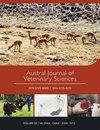Cryopreservation of horse semen with a liposome and trehalose added extender
IF 0.8
4区 农林科学
Q3 VETERINARY SCIENCES
引用次数: 5
Abstract
The aim of the study was to evaluate the effect of cryopreserved equine semen in the presence of trehalose-loaded liposomes on the integrity and function of sperm cells. Six ejaculations of five stallions collected with an artificial vagina were used. The ejaculates were diluted with INRA 96® 2:1 v/v and transported at 22 °C to the laboratory. Before cryopreservation, the semen was diluted with INRA Freeze® to obtain the following treatments: T1) INRA Freeze® (control), T2) INRA Freeze® + liposomes, T3) INRA Freeze® + liposomes+trehalose. Data were analysed using the Kruskal Wallis test. The percentages of sperm with intact DNA were 54.5, 57.9, and 64.8% for T1, T2 and T3, respectively (P>0.05). When evaluating the acrosomal and capacitation state after filtering with Percoll®, the percentages of spermatozoa without acrosome reaction and without capacitation were 67.8, 79.2 and 68.1% in T1, T2, and T3, respectively (P>0.05), while the capacitated sperm without acrosome reaction and without capacitation was similar in T1 (47%) and T3 (32%) (P>0.05), and lower in T2 (16%) before filtering with Percoll®. The use of liposomes and liposome-trehalose did not affect on the functional status and nuclear chromatin of the equine sperm after freezing, but it did affect the percentage of capacitated sperm without acrosome reaction after selecting the thawed semen using the Percoll® gradient.添加脂质体和海藻糖的马精液超低温保存
本研究的目的是评估在海藻糖脂质体存在下冷冻保存的马精液对精子细胞完整性和功能的影响。使用人工阴道收集的五匹公马的六次射精。射精液用INRA 96®2:1 v/v稀释,在22°C下运输到实验室。冷冻保存前,用INRA Freeze®稀释精液,得到以下处理:T1) INRA Freeze®(对照),T2) INRA Freeze®+脂质体,T3) INRA Freeze®+脂质体+海藻糖。使用Kruskal Wallis检验分析数据。T1、T2和T3时精子DNA完整率分别为54.5%、57.9%和64.8% (P < 0.05)。在评价Percoll®过滤后顶体和获能状态时,T1、T2和T3无顶体反应和无获能的精子比例分别为67.8、79.2和68.1% (P>0.05),而在Percoll®过滤前,T1(47%)和T3(32%)无顶体反应和无获能的获能精子比例相似(P>0.05), T2(16%)较低。脂质体和脂质体-海藻糖的使用不影响冷冻后马精子的功能状态和核染色质,但在使用Percoll®梯度选择解冻精液后,确实影响了无顶体反应的有能力精子的百分比。
本文章由计算机程序翻译,如有差异,请以英文原文为准。
求助全文
约1分钟内获得全文
求助全文
来源期刊

Austral Journal of Veterinary Sciences
Veterinary-General Veterinary
CiteScore
1.60
自引率
0.00%
发文量
18
期刊介绍:
Austral Journal of Veterinary Sciences (formerly Archivos de Medicina Veterinaria) publishes original scientific contributions in English, containing the latest developments and discoveries in veterinary sciences. The journal covers topics such as animal health and production, preventive medicine, zoonosis, pharmacology and therapeutics, methods of diagnosis, and other areas related to the veterinary field.
Austral Journal of Veterinary Sciences aims to divulge information about advances in veterinary medicine among universities, research centres, industries, government agencies, biologists, agronomists and veterinarians.
 求助内容:
求助内容: 应助结果提醒方式:
应助结果提醒方式:


